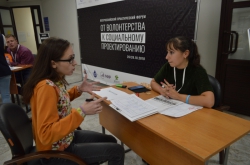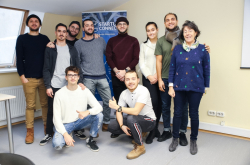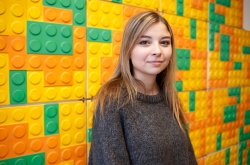The contest was, in essence, a well-rounded educational program. The teams went all the way from generating an idea to showcasing it, finding partners and getting first results. Thus, its participants got both theoretical and practical knowledge that will help them with developing social projects in their home regions.
This year, the contest took place in the Yagodnoe sports camp. For three days - from May 19 to 21, the students presented different social projects in six categories: digital technologies; ecology; healthcare, safety, and healthy lifestyle; historical and cultural heritage; social support, and education.
Limitless fashion, St. Petersburg
 Polina Andreeva, Limitless fashion
Polina Andreeva, Limitless fashion
The project's idea came to two students of Saint-Petersburg State University of Industrial Technologies and Design, Valeria Kudrina and Polina Andreeva, when they visited the Fourth Psycho-Neurological Care Facility last year. At that time, Valeria collaborated with the Step Ahead non-profit organization, and came to the facility to conduct a workshop for children. She noticed that they often lack the simplest thing - comfortable and beautiful clothing that doesn't restrain movement. Thus, she decided to create her own fashion line for children with disabilities. The girls sewed the first items themselves, and some children at the Fourth Psycho-Neurological Care Facility have already tried them on.
"We've made clothing that fits easily, and used Velcro fasteners for it; three girls at the facility have already tried it out. It was great to see how they liked it. Surely, there are companies that make clothing for children with disabilities, but they don't take the children's tastes in style into account. We, on the other hand, aim to combine comfort and beauty," shares Polina Andreeva.
In Yagodnoe, the project's authors got to meet other participants, exchange experience, get feedback and advice from experts. In future, Polina and Valeria plan to develop their project: continue making clothing for children at the Fourth Psycho-Neurological Care Facility and launch an online store. In as soon as half a year, they plan to find sponsors, as well as finish their website.
Lilac Alley, Chita
 Anatoliy Kireev, Lilac Alley
Anatoliy Kireev, Lilac Alley
Another program for children is already being conducted by the camp's participants from Chita. Anatoliy Kireev and Svetlana Raspopova, students of the Transbaikal State University, came to the accelerator in Yagodnoe to present their Lilac Alley project that helps socialize children with oncohematologic diseases.
"Interacting with children and socializing them is what's most important in our project. We involve them in gardening - together, we plant flowers and shrubs on their dispensary's adjacent territory. Why is it so important? Most children with severe diseases spend most time inside, surrounded by doctors only. We take them out to the street, help communicate, find friends and learn something new. We are never short of volunteers - participating in social projects is common for students of our university," comments Anatoliy Kireev. The student adds that they also get help from the Pchelka Maya (Maya the Bee) charity fund.
You Are a Volunteer, Kemerovo
 Zlata Titova and Ksenia Asheulova, You Are a Volunteer
Zlata Titova and Ksenia Asheulova, You Are a Volunteer
Yet, how can one help those who are not engaged in volunteering, but want to help people? Zlata Titova and Ksenia Asheulova from the Kemerovo Cooperative Community College came up with a solution. They've developed the You Are a Volunteer quest that tells about all the volunteering programs in their region. Its participants visit volunteering centers and try themselves at different tasks; thus, towards the end of the quest, they can decide what kind of volunteering activity they would like to do.
"Our quest's goal is to help young people from our city find a volunteer organization they'd like, and decide on what they want to do for it. There are many such organizations in our region, yet students are poorly informed of their existence. This is why our task is to help them get full information, share the project's authors. We've already presented our project to the experts, and they advised us to make a mobile app for our quest. I think we will do that as well."
By Myself, Kaluga
 Viktoria Timokhina, By Myself
Viktoria Timokhina, By Myself
The experts' advice was also good help for a project from Kaluga. By Myself is an initiative by the Kaluga branch of the Russian Presidential Academy of National Economy and Public Administration. The project’s general idea is to help people with disabilities develop their own business and promote their production.
"Our main goal is to teach people with disabilities work and earn without leaving homes. For that, we conduct different workshops, including those on training leadership skills. We’ve also launched an online shop on different platforms, including social networks, where we offer items created by people with disabilities, thus helping to sell them," explains Viktoria Timokhina, student at the Russian Presidential Academy of National Economy and Public Administration.
The project's authors have already started crowd-funding for the further development of their initiative.
Apart from presenting projects, the camp's participants took part in the educational program which included open lectures, workshops and business games on social project management. The experts helped the novice social entrepreneurs polish their presentation and teamwork skills, as well as shared about the effective ways for searching partners and negotiating with them.
"One of the camp's most interesting achievements was that its program was based not on lectures, but games, and the whole educational process was in gaming format. Such approach let the participants communicate and get to know each other, and even during breaks they continued to discuss their projects and plans for collaboration," notes Yuri Kuporosov, manager at ITMO's Social Design and Entrepreneurship Center and Deputy Head of the People Need You! Social Projects Development Program.
Andrei Zlenko, Head of ITMO's Social Design and Entrepreneurship Center, adds that the new format of the project also showed great results. While last year's semi-finals of the People Need You! project were conducted in a more classical way, this year the organizers chose the Yagodnoe sports camp as the event's site.
 Alena Stepanisheva, Andrei Zlenko and Yuri Kuporosov
Alena Stepanisheva, Andrei Zlenko and Yuri Kuporosov
"We are a non-classical university, so we decided to use a non-classical approach. And I have to say that was a success, and we will continue with it, comments Andrei Zlenko. We succeeded in gathering talented youth from all over the country who came to our camp to learn how to work with investors, partners, and find new resources for their social projects."
This year, the Gazprom Neft Company that has its own Home Cities project became the project's biggest business partner. The Digital Technologies contest category for IT projects was organized as part of their social program.
As Vladimir Shutilin, Head of Gazprom Neft's Social and Charity Projects, notes, the company’s representatives and their colleagues from ITMO University have already put together general recommendations for each team. Having received them, the participants will be able to work on their mistakes so as to present their final projects at the contest's finals.

"Conducting such events outside of the city is a very good practice that we will continue. This format invites the participants to share experience and think outside the scope of their projects. By playing the business games conducted at the accelerator, the contestants come to understand that their projects will be implemented in an environment where there are many risks, so it's most important to cooperate with other projects from the non-commercial sector. Overall, I'd like to note that there were many different projects, and many of them can become successful," comments Vladimir Shutilin.
After acceleration, the contestants will continue to the stage where they will actively work on their projects and use their newfound skills and knowledge in the field of social project management. By beginning of June, the experts will help each team work on their mistakes and presentations at the camp, many authors decided to correct the vectors of their projects' development. In summer, when the projects are finalized, the teams will start implementing them; their results will be presented during the final stage of the People Need You! project in November 2017.






